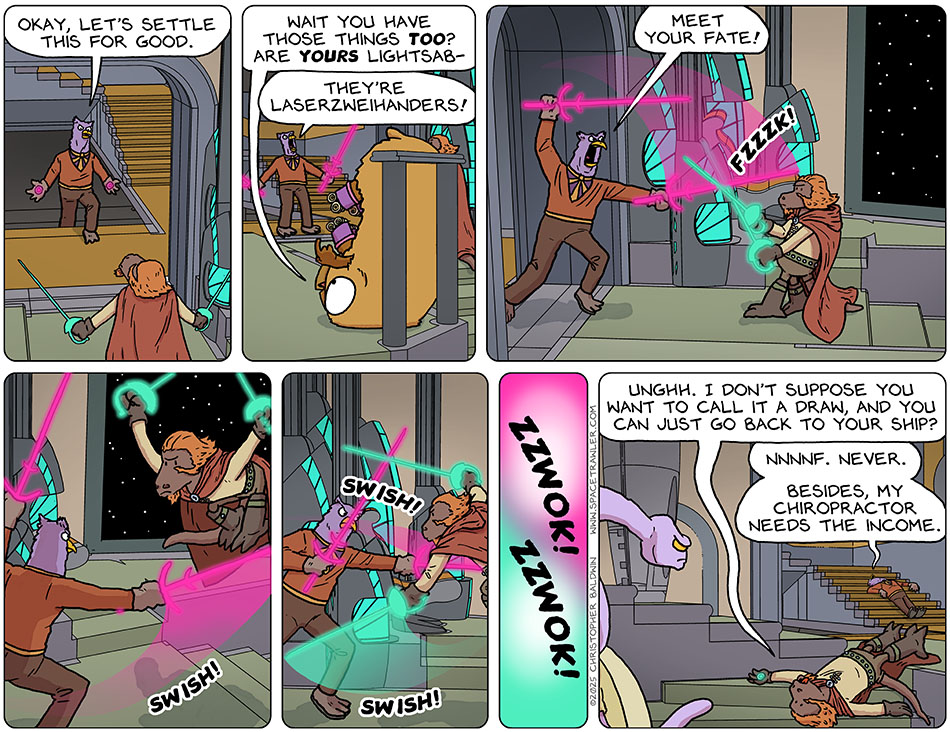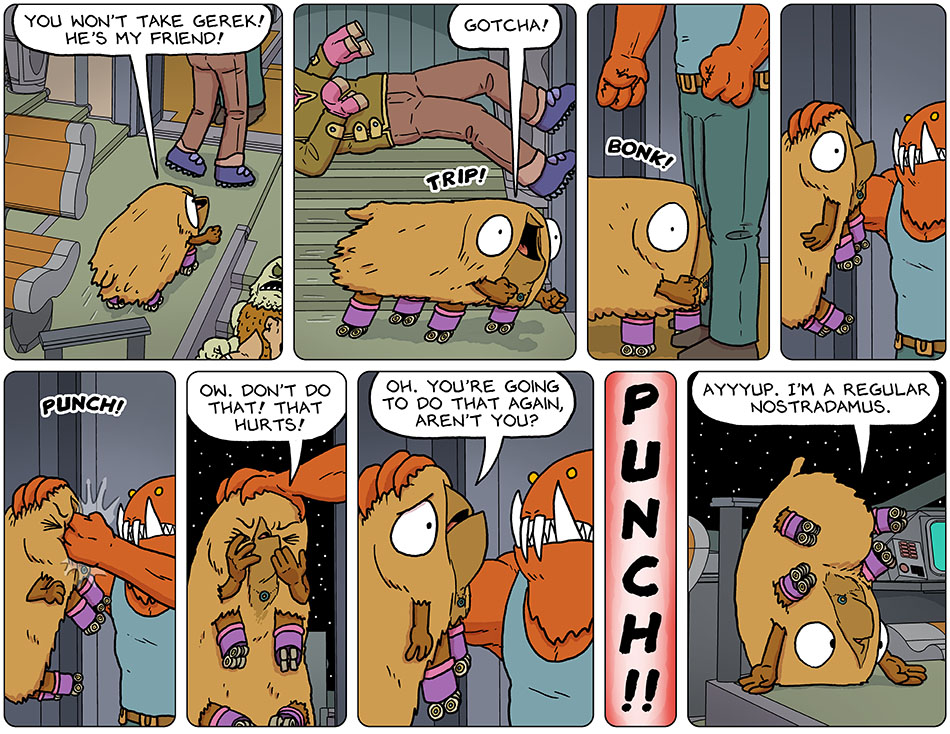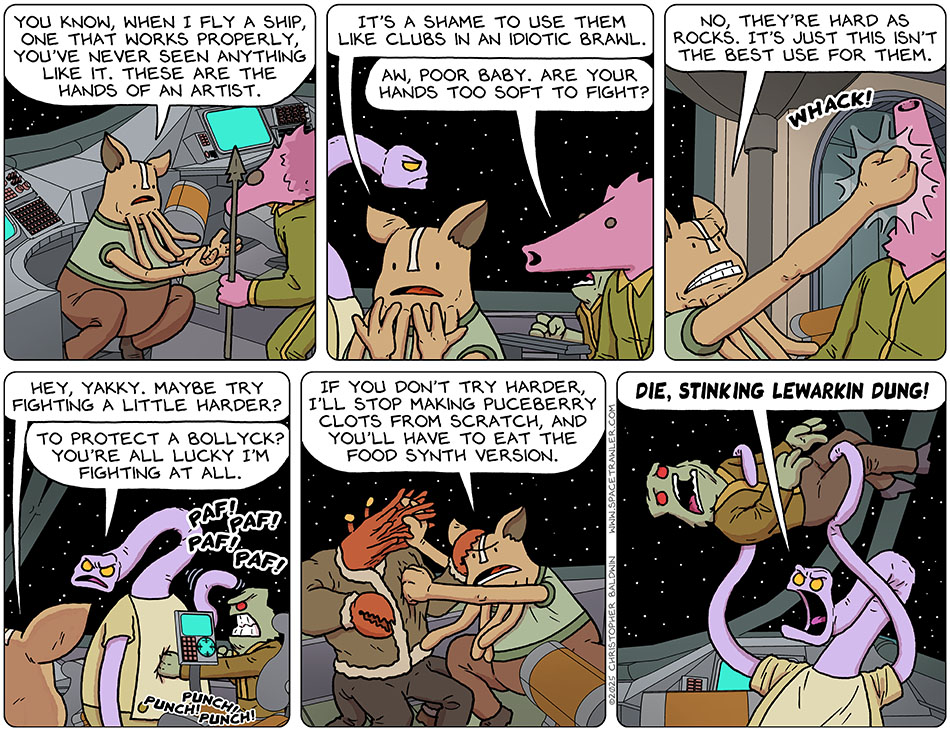04/23/25 – Lasper Meets Fate Apparently
23 April 2025 04:01 amPrevious |

Previous |
Oh, trust me, I can get sillier if you insist. 🙂
———————-Alt Text———————-
Ascending the staircase, Prought spread his arms, and it was seen that they wore similar gloves as Lasper. Prought said, “Okay, let’s settle this for good.” Watching, still upside down where she was punched to, Val said, “Wait you have those things too? Are yours lightsab-” Prought interrupted her and said, “They’re laserzweihanders!” And with a downward swing of one of them towards Lasper, Prought said, “Meet your fate!” Lasper defending himself, and Prought swung at him with the other arm, but Lasper jumped the swing. Then they both swung at each other at the same time, bot landing blows, and both propelling the other to opposite sides of the bridge. Lying on his back, Lasper said, “Unghh. I don’t suppose you want to call it a draw, and you can just go back to your ship?” Prought said, “Nnnnf. Never. Besides, my chiropractor needs the income.”
———————-/Alt Text———————-
Previous |
Türkiye National Sovereignty and Children's Day 2025
22 April 2025 09:35 pmDate: April 23, 2025
This Doodle celebrates National Sovereignty and Children's Day in Türkiye. Each year on April 23, Türkiye hosts thousands of children from around the world and gives them an opportunity to come together to celebrate and learn more about each other’s cultures.
On this day in 1920, the Turkish people took a critical step toward creating the Republic of Türkiye by founding the Turkish Grand National Assembly in Ankara. In addition to celebrating Turkish independence, exactly nine years later, the assembly agreed to Mustafa Kemal Atatürk’s proposal and declared April 23 a national holiday dedicated to children — and Türkiye became the first country to celebrate a Children’s Day.
Türkiye annually invites children from all countries to visit and join in on the festivities. Celebrations range from festivals for children to sing and dance to symbolic gestures like school children taking seats in the Turkish Parliament and “governing” the country for a day, as a reminder that children are the future.
Happy National Sovereignty and Children’s Day, Türkiye!
Location: Türkiye
Tags:
The Big Idea: Heather Tracy
22 April 2025 03:23 pm
Any author can tell you that events in their own life can have an impact on their fiction. As we learn in Heather Tracy’s Big Idea for Only a Chapter, sometimes those events have a bigger impact than we might have expected.
HEATHER TRACY:
When I began writing what would become Only a Chapter back in 2015, the working title I had then was “Faceless Man.” I knew I wasn’t going to call the book that, but I couldn’t come up with anything better. I still have several drafts of the original version saved with that name on my computer.
The big idea for the original version of the book came from dreams I had in high school through college of a faceless man who would do huge romantic things like fly me on a private jet to New York City to see Phantom of the Opera on Broadway with the original cast, then he proposed. The dreams were always very vivid, and I could always tell the man was wearing a tuxedo, but I could never see his face. Sometime after dating my now-husband for a while, I realized that when he and I originally met at my senior prom, he was wearing a tux. In different ways, a lot of the things in my dreams did happen, but much less sensationally. For instance, before he proposed, he took me to see a local production of A Chorus Line.
In “Faceless Man,” Clare had these dreams, they pointed her to this dream guy, and that was about it. The story was fun, but pretty flat. There wasn’t enough heart. There wasn’t enough tension. I put the book to the side for almost nine years.
Then, after completing breast cancer treatment in early 2023, big idea number two hit me (seriously, I can never have just one big idea for these things): What would happen if Clare had breast cancer, but also, what would happen if she didn’t? What if the story had two timelines with the ways her life could go if that dreaded phone call went two different ways? I had obviously been contemplating this scenario in my own life and thought it would be therapeutic to work it out through my fiction.
The final version of the book still has the faceless-person dreams, but this time, they’re different depending on the timeline. Clare’s bisexual, and in one timeline the dreams start pointing her toward a male, and in the other a female. In the timeline where she has breast cancer, the cancer diagnosis and story are my own, though fictionalized slightly to work within the confines of the narrative.
Oh, and the title? When I announced on social media that I had breast cancer back in 2022, I said on social media that “Cancer is only going to be a chapter in my life, and not the whole story.” Thus, Only a Chapter was born.
Only a Chapter: Amazon|Space Wizard
Today’s Adventures in Dentistry
22 April 2025 03:14 pm
Ever have that dream where your teeth fall out? Well, it’s not a dream in my case; last night, while chewing, one of my crowns tried to escape. Fortunately I realized what was happening before I bit down, and therefore saved the thing for the appointment my accommodating dentist arranged for me this morning.
The good news is the crown is now safely back in my head; the less great news is now this formerly-permanent crown is a temporary, and I have to go back in a couple of weeks to get a new permanent crown. Dentistry is confusing, y’all.
Anyway, that’s been my last 15 hours. How are you?
— JS
The World’s Hectic. Have a Dog Picture.
22 April 2025 12:23 am
See, isn’t that nice? Lowers your blood pressure all the way down, it does. We could all use that right about now.
— JS
04/21/25 – A Hard Hand
21 April 2025 04:01 am
Go Val! That’s the spirit!
———————-Alt Text———————-
Val started rolling fast at one of the aliens and she said, “You won’t take Gerek! He’s my friend!” And then she rolled into the alien and knocked it off its feet as she said, “Gotcha!” Then she ran into another alien, who picked her up with its clawed hands and punched her in the face. She squinted in pain and said, “Ow. Don’t do that! That hurts!” And then she looked at him and said mournfully, “Oh. You’re going to do that again, aren’t you?” And the alien punched her so hard she flew across the room and landed on her head, where she said, “Ayyyup. I’m a regular Nostradamus.”
———————-/Alt Text———————-
Sunset 4/20/25
21 April 2025 12:12 am
I got a new camera (a Nikon Coolpix P1100, review coming at some point), and one of the things it does really well is zoom in real close to far away objects. I tried it on the sunset today, and, yup, it got in real close. Enjoy.
— JS
Easter Flowers
20 April 2025 02:53 pm
At the local nature preserve. No need to pick them! I brought them to you anyway!
And happy Easter, if it is a holiday you celebrate. And if you do celebrate it, I hope you endeavor to live your life in a manner worthy of the redemption that Christ offered you.
— JS
The New Chair Arrives
19 April 2025 05:08 pm

There are not many physical things I actively covet in this world, but for a while now I’ve wanted a classic Eames chair. I couldn’t bring myself to purchase one because they are, in two words, stupidly expensive. There are less costly knock-off versions, of course, but in this particular case the knock-offs don’t do the psychic trick for me. If I was going to ever make the splurge, I wanted the “real thing.” After all, it was going to be my ass in the chair. But I — reasonably! — balked at spending more for a chair than I spent for my first car (even adjusting for inflation, I just checked).
Then three things happened: One, I came into some unexpected money that did not immediately have to go to bills. Two, a friend pointed out that Design Within Reach was having a 25% off sale, which meant the chair new did cost less than that first car. Three, the world is on fire, so, you know what? Fuck it. I checked with the family’s chief financial officer (i.e., Krissy) to make sure there were no objections, and then put in the order. The chair was originally supposed to arrive around my birthday, but they got it out a little early, and now here it is in my office.
And how is it to sit in? Very nice! I’m typing this while plopped down in it, and everything is groovy and it smells great. I suspect I will be sitting in it quite a bit. There was some discussion about whether to have it here or at the church, and I decided I would rather have it here than travel a couple of miles to visit it. The one drawback to having it here, however, is that I have pets, with claws and fur, to scratch and schmutz up the thing. So enjoy this picture of it without the blankets I will be using to cover it when I’m not in fact sitting in it.

(And what about the chair that was previously in the corner the Eames now occupies? It’s likely to go to the church, where there is more than enough space for it and where it will get to play with lots of other chairs. Until it gets moved, it’s residing in the dining room, which itself is undergoing some renovation, and where, as you can see, Smudge has already found it and is happy resuming his practice of napping on it. It’s a nice chair (as you can see by the fact it also has a blanket to keep it from being schmutzed up) and I’m sure it will live a long and happy life in its new environs.)
The only real downside to the Eames chair, for me, the World’s Laziest Person, is that it comes with an actual owner’s manual; apparently I will need to oil the wood on the chair once a year or so, which, ugh, fine, I guess. I do plan to keep the thing, you know, for the rest of my actual life, so I suppose I should take care of it.
Also, this marks the end of my “expensive furniture” habit. I’m too cheap, and we have too many pets and chaos for any more of this stuff. Everything else is bought with the idea it will be colonized by fur-bearing miscreants who will use it for parkour. This is fine. They can enjoy the rest of the furniture. This one thing is for me.
— JS
Anglo-Saxon
19 April 2025 01:19 pmThe first thing that made me want to write about Anglo-Saxon was my experience of French exchange students using the term to mean 'anglophone, English-speaking'. I'd warn them against the term, stating (but perhaps not explaining) that it is inaccurate and has connotations they didn't intend in British/American English. (So here comes the explanation.) The second thing is that I've been writing about the history of English and have chosen to mostly refer to Anglo-Saxon rather than Old English and I'm thinking about that choice. The third thing is that Dave Wilton (who writes the fantastic Word Origins newsletter) published a paper in 2020 on the topic that's been on my TBR pile for a while—so writing this post provided me with an excuse to take the time for it.
Anglo-Saxon v Old English
 |
- ca. 450AD/CE to 1150ish: Old English/Anglo-Saxon.
from the Germanic invasions till the start of Middle English. This can be further divided into prehistoric (450–650), early (650–900) and late periods (900–1150). Beowulf is the most famous literary work from this time. - 1066 to 1500ish: Middle English
from the Norman (French) invasion through the Great English Vowel Shift. This also has early and late periods. Chaucer's Canterbury Tales is the most famous bit. - 1500ish to 1650ish: Early Modern English
Shakespeare times. King James Bible times. - 1650ish to now: Late Modern English
No more thou, no more hath, and lots more vocabulary thanks to industriali{s/z}ation and the spread of English worldwide.
Anglo-Saxons = English speakers?
At the height of the British Empire, English intellectuals were taken with the notion of an “Anglo-Saxon race”, tracing its roots to the Germanic peoples who settled in Britain after the Romans left in the 5th century. With self-satisfaction they concluded that their “race” was something special, illustrated by the strength of their culture over that of the conquered Celts, their early codification of individual rights with the Magna Carta in 1215, and their break with the Roman church in the 16th century. Belief in their own good example made appropriating other peoples’ lands much easier to justify – and Americans of English stock were happy to share in this myth. But by the 20th century, talk of an Anglo-Saxon race had fallen out of fashion, and instead of genetic inheritance, it was language that seemed to unite us.
Thus we started to be called the English-speaking peoples, a term used with particular influence by two statesmen-historians, Theodore Roosevelt in The Winning of the West and Winston Churchill in A History of the English-speaking Peoples. President and prime minister turned to this language-based description of “our peoples” because other possible descriptions had become impossible.
My French students were still using the Anglo-Saxon race to refer to 'the English-speaking peoples'. One problem in using the term that way is that "races" allegedly have a common genetic heritage, and English-speakers don't. Many Americans cannot trace their ancestry back to England. We are a transatlantic linguistic group and we share some aspects of our cultures. But it's weird to call us a race in contemporary English.
- une politique audacieuse pour défendre la langue et la culture française qui se trouvent aujourd'hui particulièrement menacées par l'invasion de la langue anglaise et de la culture anglo-saxonne .
a bold policy to defend the French language and culture, which are today particularly threatened by the invasion of the English language and Anglo-Saxon culture.
- L'hôpital a mis en place un concept qui vient des pays anglo-saxons nommé "Kids friendly".
The hospital has implemented a concept that comes from Anglo-Saxon countries called "Kids friendly".
- cette brutale franchise, qui caractérisent la race anglo-saxonne .
that brutal frankness, which characterizes the Anglo-Saxon race. - Cette ardeur chrétienne est-elle particulière à la race anglo-saxonne ?
Is this Christian ardo(u)r peculiar to the Anglo-Saxon race?
The Anglo-Saxon race-ism
- "The new Constitution eliminates the ignorant Negro vote and places the control of our government where God Almighty intended it should be – with the Anglo-Saxon race ," John Knox, the president of the [Alabama] constitutional convention, said in a speech encouraging voters to ratify the document [in 1901] [source]
- Galton declared that the "Bohemian" element in the Anglo-Saxon race is destined to perish, and "the sooner it goes, the happier for mankind." [source]
WASP
For the sake of brevity we will use the nickname 'Wasp' for this group, from the initial letters of ‘White Anglo-Saxon Protestants’.
Three uses of Anglo-Saxon in American and British corpora (Wilton 2020)
Wilton, David. 2020. What Do We Mean By Anglo-Saxon? Pre-Conquest to the Present. The Journal of English and Germanic Philology 119.425–454. doi:10.5406/jenglgermphil.119.4.0425.
Wilton tracks three uses of Anglo-Saxon:
- Pre-Conquest: referring to the Germanic peoples of Britain before 1066
- Politicocultural: "references to the politics, economics, and culture of present-day Britain, the United States, Canada, Australia, and New Zealand, and especially the transnational characteristics that these nations share that are not explicitly ethnic or physiognomic." (p. 433) So: like the French usage above.
- Ethnoracial: "any use of Anglo-Saxon that is applied to an individual person; that refers to physiognomy, personal appearance, DNA or genetics or ancestry; or that contrasts Anglo-Saxon with another ethnic or racial group, as well as instances of the phrase white Anglo-Saxon Protestant and the acronym WASP." (p. 433)
Moving on to more recent times, here's what Wilton found in the Corpus of Contemporary American English (COCA):
In Britain, there's either even (BNC, 1980–93) distribution of ethnoracial and politicocultural or lots more politicocultural (NOW, 2010s). Wilton writes:
One might have expected an increase in the ethnoracial uses of “Anglo-Saxon” [in the UK] since the advent of the Brexit era, but the data shows this not to be the case. Any impression otherwise is probably due to increased awareness of ethnoracial uses of the term. In other words, people are only now noticing the uses that have always been there or are now reading ethnic connotations into the term that they had not before.
A wise American reporter based in London once told me that every British news story is, deep down, about class. Every American story, he said, is about race.
Because Apparently I’m In a Musical Mood Today: A Cover of “Desperado”
19 April 2025 01:55 am“Two covers in one day? Scalzi must really be at loose ends without his spouse!” Well, yes. Yes, I am. Mopey and lonely and vulnerable to maudlin songs about depressed cowboys, apparently. Anyway. Here’s the Eagles. Enjoy.
— Js
A Cover Song for Krissy: “Your Song”
18 April 2025 08:45 pmBecause she’s away and I miss her and I wanted to make sure she had something from me on her birthday, and she’s moving around so flowers would be difficult to send. This is of course the famous song from Elton John. Folks paying attention will note I made one lyrical change, because while Krissy’s eyes are sometimes green, they are never blue.
Also for music production nerds, I finally figured out comping, and the vocal performance here is from fifteen different takes. And still I have a couple of bum notes! That’s on me, not the DAW.
In any event, enjoy this birthday present to my wife.
— JS
Happy Birthday Krissy
18 April 2025 10:45 am
She’s the best person I know and I love her the most, but I think you all know that. I’m happy she’s in my life and I get to be in hers. And it’s her birthday! May she have many more, and may I be here to see them.
— JS
04/18/25 – A Soft Hand
18 April 2025 04:01 am
Sometimes we all need some inspiration to bring out the best in us.
———————-Alt Text———————-
Kniff looked down at their hands as a pink alien approached. Kniff said, “You know, when I fly a ship, one that works properly, you’ve never seen anything like it. These are the hands of an artist. It’s a shame to use them like clubs in an idiotic brawl.” The pink alien said, “Aw, poor baby. Are your hands too soft to fight?” Kniff slugged the pink alien in the jaw and said, “No, they’re hard as rocks. It’s just this isn’t the best use for them.” Then Kniff turned and said to Yakky, “Hey, Yakky. Maybe try fighting a little harder?” Yakky, who seems to not care the an alien is hitting her, was lightly hitting that alien with a soft “paf paf paf.” Yakky said, “To protect a Bollyck? You’re all lucky i’m fighting at all.” Kniff said, “If you don’t try harder, I’ll stop making puceberry clots from scratch, and you’ll have to eat the food synth version.” So upset by this, Yakky picked the alien over her head and yelled, Die, stinking Lewarkin dung!”
———————-/Alt Text———————-












